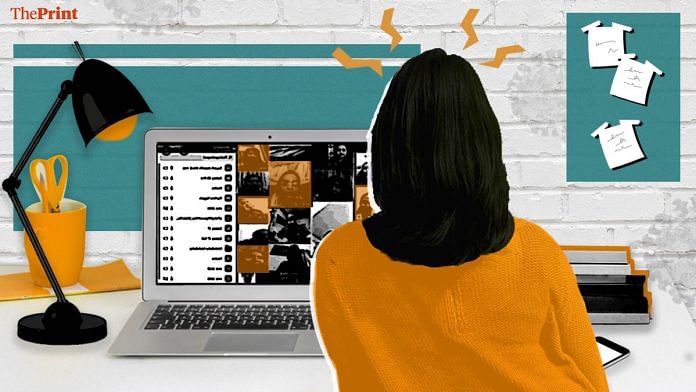If you thought online classrooms and study from home will make women safer, think again. Predators lurk on zoom sessions as well. The Covid-19 pandemic has added a new wrinkle to the old problem of sexual harassment that female students face in schools and colleges.
Recording of online classes, random auditing to monitor teachers’ behaviour, and a grievance hotline — these and some more were among the measures brought out by the Tamil Nadu government this week to prevent sexual harassment of students. Last month, the capital city Chennai was rocked with sexual misconduct accusations against a 59-year-old commerce teacher from the prestigious Padma Seshadri Bala Bhavan (PSBB) school.
The stories narrated by students about their experiences of an online session were horrifying. The teacher, G. Rajagopal, would allegedly turn up for online classes in a towel, send lewd messages to the girl students and share pornographic links. They were later circulated on Instagram and Facebook by the school’s alumni. Screenshots documenting his conversations with the students also surfaced on Twitter. Apart from setting off a probe, the case started a much-needed discussion— the shadow consequences of classes moved online in the wake of the Covid pandemic.
The problem of online sexual harassment is pervasive and has been common long before the pandemic made them a necessity. But classes going entirely virtual have made conditions rife for an upsurge in such incidents. The offenders are usually known to the victims and often in a more powerful position that enables them to carry out the crime.
Online spaces can be more hostile, because unlike crowded classrooms, they allow predators to single out their prey for targeted harassment. A 38-year-old science teacher of a government-aided school in Mudukulathur, Tamil Nadu, was nabbed Thursday for inappropriate conversations with a class IX student. The accused, A. Habeeb Mohammed, had also coerced her into sexual activity for better marks. He has been arrested under the Protection of Children from Sexual Offences (POCSO) Act. Since most part of the upcoming year is going to be spent virtually, the directives issued by the M.K. Stalin government were an urgent need of the hour.
Also read: Anxiety for students, violation of privacy — The problems with online proctored exams
A national pandemic
Although the spotlight of the emerging sexual harassment in online classes might have fallen on Tamil Nadu, the abuse is not limited to this state. In the past few months, misconduct has been reported from across the country. The National Student Union of India (NSUI), on its Twitter page Monday, exposed a proctor’s misbehaviour with a girl student during online examinations conducted by Christ University, Bengaluru. The proctor had allegedly called the student “baby”, on being asked a question about the exam. This sparked outrage on Twitter, with several other users sharing their own past ordeal. One recalled a time when proctors used to allegedly ask girls to bend the camera down.
Experiences in universities have been no better than schools despite it providing a more aware environment. Seven “defiant” first-year students of Aryabhatta College of Delhi University had been suspended in February for misbehaving with female students over text messages. The male students had repeatedly made unwanted advances towards their classmates even after complaints were lodged against them. Eventually, the college’s disciplinary committee had to intervene. The existence of social media groups where women are objectified and sexualised are already far too common. But it’s for the first time that we are witnessing cases like ‘bois locker room’.
According to a study, 83 per cent of women in India have experienced online harassment of some kind, and 70 per cent of those surveyed believed cyber harassment increased since the lockdown was announced. Professor Julia Ferganchick of University of Arkansas argues that patriarchal domination extends to the online space, which simply mimics the real-life instances of discrimination and harassment against vulnerable groups. She asserts that the gender and the hierarchical arrangements of our society do not disappear on forums where we don’t “see each other”, but on many occasions are further exacerbated.
Also read: That feeling of loss: What school year 2020 has been like for students of Class 10 & 12
Teachers are at risk too
While there have been many instances of cyber bullying of female teachers, little attention has been paid to a much serious issue at hand — their students’ inappropriate conduct. From winking to flashing suggestive photographs, students in Uttar Pradesh have been indulging in all kinds of vulgarity. Male students making obscene gestures at teachers are routine, with the latter having no other option but to ask them to log out.
The beginning of the pandemic was particularly marked by floods of abuse against female teachers. A professor at a Delhi University’s south campus college last year reported an instance of a student writing expletives in the classroom chat. There were also incidents where invites for live sessions on Zoom were shared with outsiders. A teacher from an all-woman college in West Delhi recounted how an outsider logged into her class with a username of an “adult movie” actress and had started abusing her.
Whether it be students or teachers, it seems no one has been spared from the rampant sexual harassment going on inside the virtual classrooms. It can be a trigger for embarrassment and grave psychological issues, apart from a clear violation of privacy and an attempt to outrage the modesty of the victim. Both the school and the State have a responsibility to ensure a safe community where teachers and students can interact without the fear of being harassed. In this view, what Tamil Nadu government has done to address this issue can be emulated nationwide and will be a much welcome change in bringing security to online learning.
Views are personal.
(Edited by Prashant Dixit)



